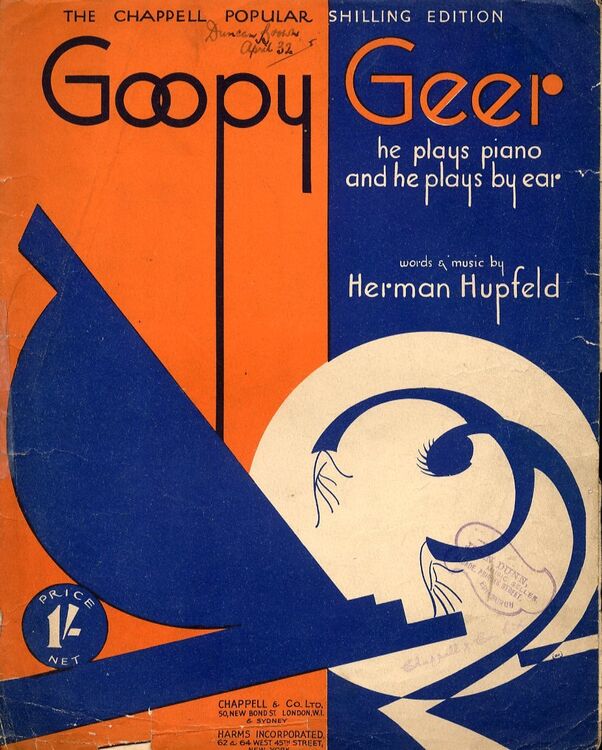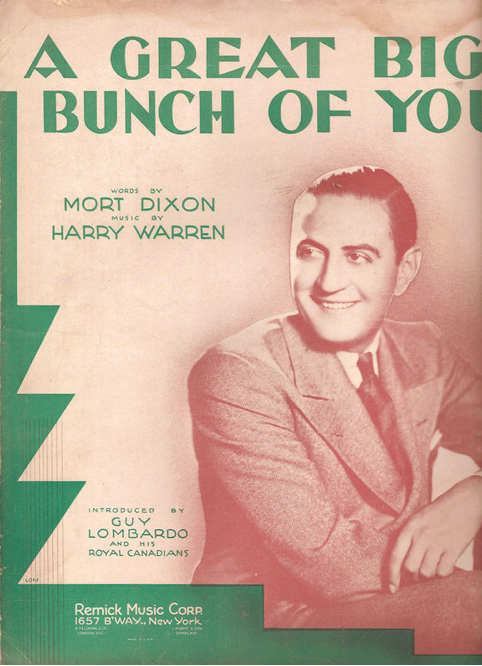Come On, Caress That Old Klavier!

It’s funny how some artifacts are saved by accident. I listen to a lot of 20 and 30s music, and while one can load Youtube and find hundreds of recordings of hit songs like Irving Berlin’s “Blue Skies”, other great songs of yesteryear have not achieved the same timelessness.
A few months ago I came across a wonderfully catchy song called “Goopy Geer”, by “As Time Goes By” songwriter Herman Hupfeld in early 1932 and subsequently recorded by prolific British crooner Al Bowlly. I was curious to hear how others had recorded “Goopy”, but to my shock I couldn’t find any other rendition. Instead, I was overwhelmingly linked to the following Merrie Melodies short:
At first I thought the song must have come from the short, considering how drastically it eclipsed the song in history. But after tracking down the sheet music, it turned out the song was published months before the short premiered in April of 1932.
Leon Schlessinger’s Goopy Geer is an idiot savant pianist, similar to the Goopy Geer of Hupfeld’s song, but here is depicted as a floppy-eared dog not far different from Disney’s more famous Goofy–a character who appeared only a few weeks after Goopy made his animated debut.
Curiously, while Hupfeld’s song is used liberally throughout the eponymous cartoon, the only musical credit on the short goes to Frank Marsales, who composed the background score for every Harman and Ising Merrie Melodies outing.
…or did he?
I was lucky enough to catch Joe Dante’s screening of Roger Corman’s masterpiece The Intruder at MoMA back in October, which was preceded by Joe’s segment from Twilight Zone: The Movie. The segment, It’s A Good Life, makes great use of Warner shorts in telling a story about a young boy who can manipulate the reality around him, just like the cartoons he’s obsessed with watching.
I recognized the delightfully creepy “The Teddy Bear’s Picnic” and “Ain’t She Sweet” in the background of two of the WB shorts used in Dante’s segment. Were these songs credited?
In November of 1932, A Great Big Bunch of You was released, again with “music by” Marsales.
Except the song “A Great Big Bunch of You” was written months earlier by Harry Warren and Mort Dixon, neither of whom were credited in the short.

How many more such musical shorts are out there without acknowledgment to their original composers? Perhaps it’s unfair to cry foul about the lack of credit. Perhaps Warner Bros. made a habit of purchasing swaths of song rights with the composers’ understanding that credit wouldn’t be provided. Perhaps, in 1932, Merrie Melodies functioned like a Muppet Show sketch–parodying a song so obvious and well-known to the public at the time that the credit was simply not needed. Unfortunately, that lack of acknowledgment, 80 years later, means the pop culture history behind many of these shorts has vanished into the sands of time.
Both A Great Big Bunch Of You and Goopy Geer are rather mediocre shorts, and it’s not a surprise that the character never took off. But apparently Goopy was a big enough blip in the history of animation to warrant a Wikipedia entry that makes no mention of his real creator–Herman Hupfeld.
As far as I’ve been able to determine, there were four recordings of “Goopy Geer” made aside from the lackluster Merrie Melodies take: Victor Young & His Orchestra with Hupfeld on vocals on January 22, 1932, Ambrose and His Orchestra with Sam Browne on vocals on February 15, 1932, The Masqueraders (Carroll Gibbons’ Orchestra) with Al Bowlly on vocals on March 24, 1932, and finally Jack Hylton and His Orchestra sometime in 1933. UPDATE 2021: There was also an American version by Ramona, and a British version by Ray Starita.
Unfortunately the only recording that hasn’t survived in Hupfeld’s. Hopefully a lucky 78 collector will stumble upon it one of these days and give us a chance to hear the composer perform it the way it was intended to be heard. (Until then, the Bowlly version is far and away the best of the three remaining.) UPDATE 2021: The Hupfeld version has been uploaded to archive.org here.
Of course, Hupfeld went on to bigger and better than Goopy Geer. “As Time Goes By” became an astronomical hit due to its use in Casablanca, and is now a fanfare of sorts for the same Warner Brothers who left his credit for Goopy on the cutting room floor.




